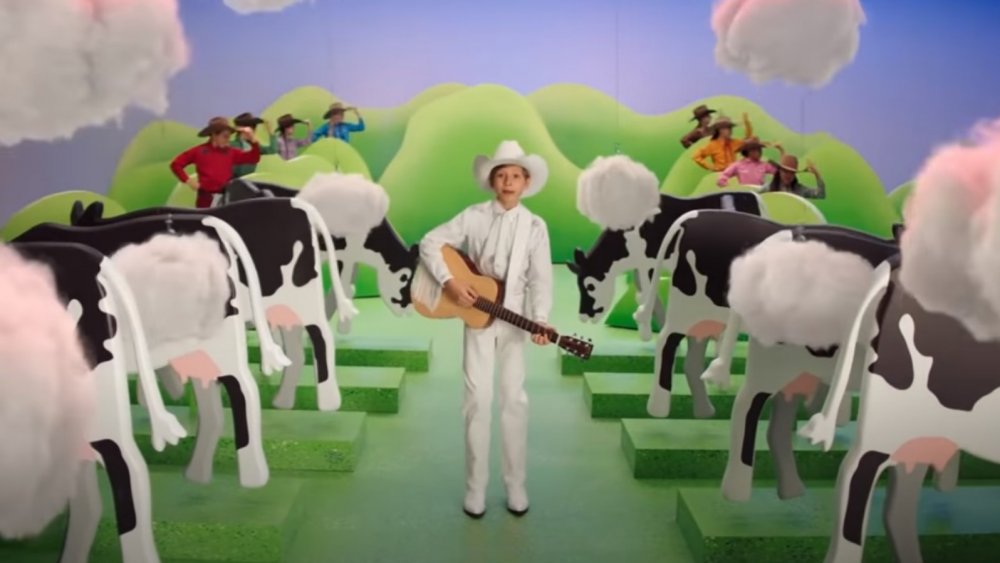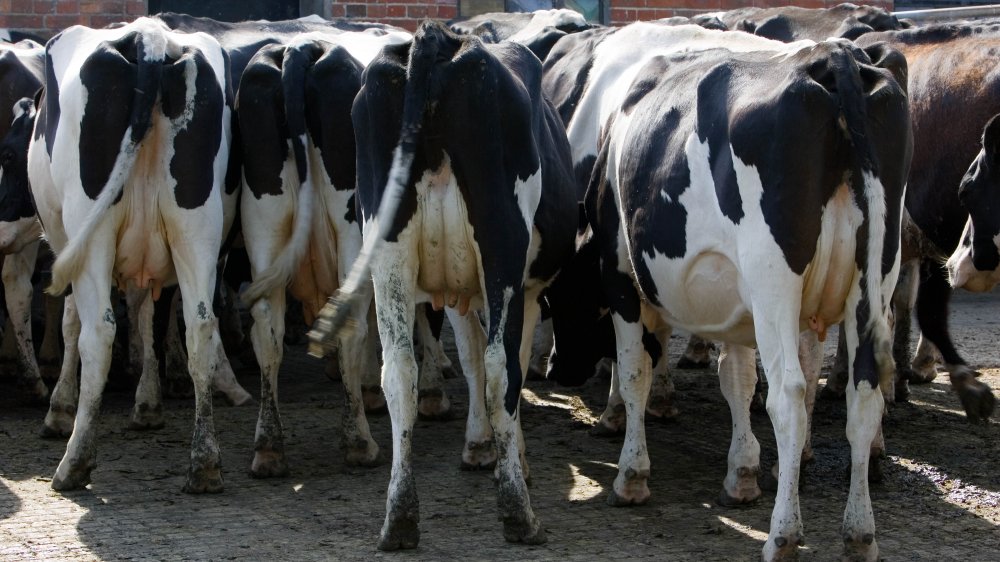The Real Reason Burger King Pulled Its Cow Farts Ad
While Burger King advertising overseas may be able to keep on their audience's good side (and even on occasion go above and beyond as they did with their recent "Love Conquers All" campaign in Finland, which managed to weave a beautiful allegory out of the forbidden love between a certain jovial king and retired clown), Burger King North America isn't always as great at keeping things palatable. They kicked off 2020 by grossing us out with time-lapse footage of a decaying Whopper, and then went on to top themselves this past summer by releasing a two-minute long video featuring Yodel Boy in front of a chorus line of cowboy-clad kids in gas masks, singing a catchy tune about how bovine flatulence is going to destroy us all. Fun stuff, for sure, but the ad didn't run long (except on YouTube, where it will doubtless survive in perpetual infamy).
So what made Burger King pull this ad when they've faced a storm of backlash before without flinching? After all, if they were that afraid of public opinion, why would they have kept their creepy, unpopular mascot (via The Atlantic)? Well, Burger King may not be afraid of what people think, but they appear to have enough the sense to stop spreading false information once their factual errors were pointed out to them.
What was wrong with Burger King's claims
The gist of the advertisement (besides fart jokes and a surreal kiddie hoedown) is that methane produced by cow flatulence is a significant cause of global warming. The ad also states that Burger King will be doing their part to combat said warming by switching to beef sourced from cows fed lemongrass in order to reduce their emissions. Unfortunately for the fast food company, as many farmers and scientists pointed out, both of those assertions are problematic, to say the least.
One of the ad's critics, Frank Mitloehner, a professor in the Department of Animal Science at the University of California, Davis tweeted, "IT'S. NOT. THE. COW. FARTS." and went on to explain, "Nearly all enteric methane from cattle is from belching. Suggesting otherwise turns this serious climate topic into a joke." Sustainable Agricultural Innovations and Food agrees with Mithloehner, stating that only 5 to 10 percent of cattle methane emissions come from manure and flatulence, while the remaining 90 to 95 percent comes from burps. What's more, agricultural methane isn't even a major source of greenhouse gas, as in both the U.S. and Canada it only accounts for about 10 percent of all emissions (and of that 10 percent, just 44 percent comes from either end of a cow). Neither is adding lemongrass to the cow's diets necessarily a cure-all for their flatulence, as results from the ongoing research have not proven conclusive.
Some in the beef industry felt attacked by the ad
As soon as the Burger King cow farts ad came out, a chorus of protests was heard from people in the agricultural industry who felt they were being unfairly blamed for ruining the environment (via AGDAILY). Luckily, Burger King execs were willing to listen to the valid complaints raised, and the company's Chief Marketing Official Fernando Machado had a Zoom call with mythbuster Farm Babe (aka Michelle Miller) to discuss the issues. During the call Miller not only pointed out the errors presented in the commercial, but also how wrong she felt it was of them to attack the beef industry. She told Machado, "We in agriculture constantly feel attacked... it would be nice to have brands actually thank us and showcase the work we do. Lift us up, don't tear us down. Without farmers, Burger King has no beef at all."
Drovers states that the company also reached out to Mitloehner, and asked the animal science professor to explain the fallacies in their fart-blaming. In response to that conversation, Burger King not only pulled the ad, but agreed to have him consult with them on any future ads they were contemplating based around their beef production. The outlet says that the professor told agriculture radio news show Agritalk, "They have asked me to cooperate with them in order to infuse science-based research on the one hand and get communication out — and check it before it reaches the masses". Thanks, Burger King! Pulling the ad and pledging to do better was definitely the right moo-ove.


